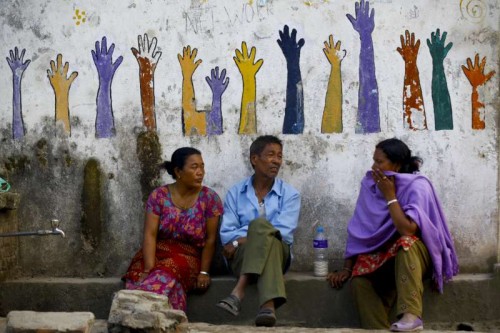
Britain has already provided much-needed emergency shelter to more than 65,000 displaced people across Nepal and more shelter kits are being delivered in the coming days, International Development Secretary Justine Greening announced today.
The majority of the shelter kits already distributed had been put in place before the earthquake struck, as part of DFID’s preparation for a disaster of this magnitude, and the remaining were flown into Nepal in the days following the earthquake. This meant UK aid supplies were among the first to reach communities who lost their homes following the earthquake.
On top of the shelter already distributed, DFID will deliver nearly 20,000 more shelters to Nepal in the coming weeks, enough to house over 100,000 people. The Government of Nepal estimates that 500,000 homes were destroyed in the 7.8 magnitude earthquake, leaving millions without shelter as the monsoon season approaches.
Flights carrying 9,500 shelter kits, each with two tarpaulins, will be flown in from the DFID warehouse in Dubai and another 10,000 kits will be delivered by truck from India.
Following the Government of Nepal’s announcement that the search and rescue phase is coming to an end, the UK’s International Search and Rescue (UKISAR) team are now returning home. During their deployment they played a key role in the relief effort, carrying out search operations, providing first aid and making safe a hospital that can now treat hundreds of patients.
Justine Greening said:
“Our pre-positioned shelter kits meant that within 24 hours of the earthquake British aid was reaching communities who had been hit hard and providing temporary homes to thousands of people across Nepal. Ahead of the monsoon season, we are delivering thousands more to help the Nepalese people cope as they recover from this tragic disaster.
“I would like to thank our incredible search and rescue workers and medics whose tireless efforts are saving many lives. We should feel immensely proud of these brave men and women and the role they are playing in Britain’s humanitarian response to the earthquake in Nepal.”
The UK will continue to play a leading role in responding to the earthquake in Nepal and is currently the largest donor to the relief operation. Teams of British medical experts and the Queen’s Gurkha Engineers remain in country and are doing all they can to support relief and recovery efforts on the ground. The British Gurkhas will also continue to perform search and reconnaissance missions.
Through Mission Aviation Fellowship (MAF) DFID is also funding two Airbus 350 helicopters that will allow people and goods to reach remote regions to help vulnerable people who have been stranded or cut off via avalanches. If necessary, they will be able to support casualty evacuation from remote villages to medical facilities.
The UK Government is continuing to provide consular assistance to British nationals who have been caught in this disaster.